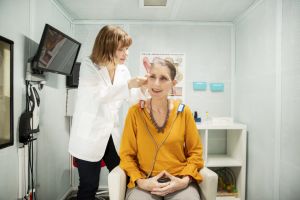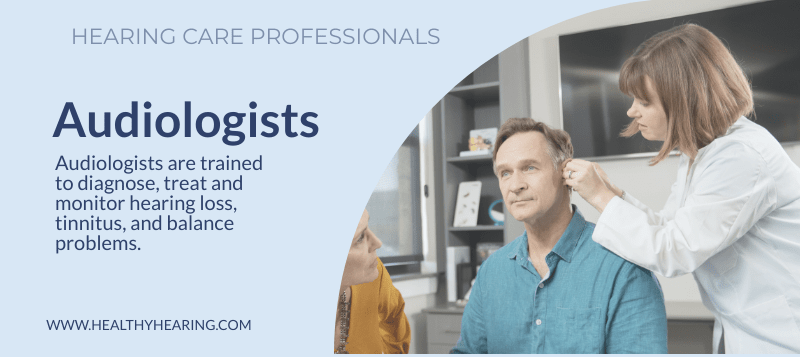|
www.HealthyHearing.com |
What is an audiologist?These healthcare professionals diagnose and treat hearing disorders
Contributed by Joy Victory, managing editor, Healthy Hearing Key points:
An audiologist is a type of hearing healthcare professional that diagnoses, treats and monitors conditions like hearing loss, tinnitus, and balance disorders. Audiologists train to perform a wide variety of tasks, including but not limited to:
Audiologists work in a wide variety of settings, from private hearing clinics to major research hospitals. Pediatric audiologists work with infants and kids and often collaborate with with other specialists like speech pathologists, early intervention specialists and ENTs.
What is the difference between an audiologist and a hearing instrument specialist? (HIS)?Hearing instrument specialists can perform hearing evaluations and fit hearing aids, just like audiologists. However, audiologist can also treat more complex hearing and balance problems. What is the difference between an audiologist and an ENT?Ear, nose and throat (ENT) specialists are medical doctors (MDs) who diagnose and treat disorders of the ear, nose, throat and lower skull. Audiologists often work in ENT offices, to help patients with hearing-related issues. What kind of training do audiologists have?
of settings from hearing aid clinics to schools to hospitals. All new audiologists are required to have a doctor of audiology (AuD) degree, which typically takes four years to complete. Most students admitted to AuD programs have an undergraduate degree in communication sciences and disorders. However, some programs will admit students with other undergraduate majors, as long as the student took the needed pre-requisites. Licensure and certificationAfter earning their degree, new audiologists must be licensed by their individual states. This process typically involves a written and/or practical exam. Audiologists can earn other certifications to help boost their prominence and trustworthiness in the field. These include the Certificate of Clinical Competence (CCC) from the American Speech and Hearing Association (ASHA) and board certification from the American Academy of Audiology (AAA). When to see an audiologistYou should see an audiologist if you're experiencing issues like difficulty hearing, frequent ringing in your ears, or trouble with balance. Also if you are regularly exposed to loud noise on your job, have a history of hearing loss in your family or are over 60 you should consider scheduling an appointment for a complete audiological exam. If you experience any sudden changes to your hearing, seek immediate medical attention. Visit our directory to find an audiologist near you. Joy Victory, managing editor, Healthy Hearing
|
Featured clinics near me
Earzlink Hearing Care - Reynoldsburg
7668 Slate Ridge Blvd
Reynoldsburg, OH 43068

Find a clinic
Need a hearing test but not sure which clinic to choose?
Call 1-877-872-7165 for help setting up a hearing test appointment.



 Joy Victory has extensive experience editing consumer health information. Her training in particular has focused on how to best communicate evidence-based medical guidelines and clinical trial results to the public. She strives to make health content accurate, accessible and engaging to the public.
Joy Victory has extensive experience editing consumer health information. Her training in particular has focused on how to best communicate evidence-based medical guidelines and clinical trial results to the public. She strives to make health content accurate, accessible and engaging to the public.